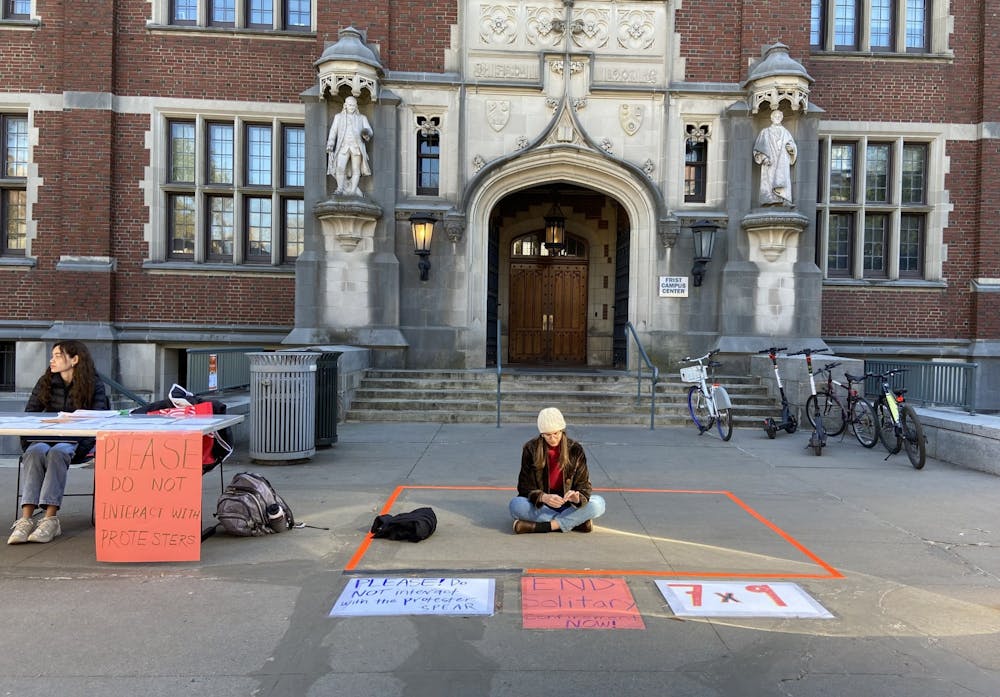Students for Prison Education and Reform (SPEAR) held their annual performance protest against solitary confinement titled “7x9” in front of Frist Campus Center this week. The protest lasted for 23 hours, starting at 2 a.m. on Wednesday, Nov. 9 and concluding the next day at 1 a.m., in a gesture to the 23 hours a day that individuals in solitary confinement must stay in their cells.
During the event, protestors stayed in a taped 7 by 9 foot square, the typical size of a solitary confinement cell. There was another organizer stationed at a nearby table to speak with passersby throughout the protest. A sign mounted in front of the stand requested that passersby refrain from interaction with the protester in the box, simulating the total lack of human contact prisoners in solitary confinement experience. Volunteers affiliated with SPEAR took one hour shifts standing in the box, rotating shifts for the duration of the protest.
Signs near the table and taped-off square highlighted statistics such as “people punished by solitary confinement are approximately seven times more likely to commit acts of self-harm” as compared to the general prison population. Quotes from incarcerated individuals who describe facing extreme abuse and neglect were also featured, as well as fliers to join Project Solidarity, a student-run pen pal program that allows students to write letters to individuals currently in solitary confinement.
“The size of the box is obviously shockingly small,” said Luke Carroll ’26, a member of SPEAR who took the 6 a.m. shift inside the box.
Carroll praised the visual component of the protest, which he said made it easier for passersby to visualize the conditions prisoners face.
“I think it helps to orient people to the size of the cell, and if they can allow themselves for just a second to imagine that the protestor is surrounded by concrete walls and a steel door, that just makes it all the more dramatic,” he said.
Caroll highlighted other aspects of the protest that do not fully capture the experience of solitary confinement. He also noted the inhumane conditions prisoners face, such as inadequate medical treatment, sexual intimidation, and physical torture. For Caroll, whose family friend experienced solitary confinement and “suffered many of the tortures therein,” these harsh realities are personal.
Chloe Yang ’26, another protestor, also spoke to close connections to the issue as a primary motivation for her involvement with SPEAR.
“[S]ome personal friends have been impacted by the so-called prison industrial complex,” she said. “I wanted to learn about what resources there are on campus and also in our local community.”
Yang said that during her hour in the box, she had no sense of how much time had passed.
“There wasn’t anything to distract me. I can’t imagine what it would feel like to go through this for a year,” she said.
“I think this experience has taught me to be more grateful about what I have, like all sorts of very basic things such as food and shelter, ability to work, and to have a normal life here on campus. These are actually things that other people, including people our age, are not allowed,” she added.

According to Carroll, a common misconception about solitary confinement is that only the most extreme criminals are subject to this punishment.
“Right now, there are more than 80,000 Americans in solitary confinement cells, including children,” he explained. “Its use is virtually indiscriminate, and that’s part of what makes it so brutal.”
Yahya Habib ’26 was one student who passed by the protest and stopped to speak with the organizers.
“I was notified about the demonstration within the past one or two days and I definitely wanted to show up to see if there was anything I could do,” Habib said.
He said he had studied the issue of solitary confinement in the past, and that in his opinion, it is an “inhumane” and “unjust” form of punishment.
SPEAR has several other ongoing projects, including Project Solidarity and a reentry committee, which hosts a class every Wednesday for former inmates. The hope for more involvement with these initiatives from the Princeton community was emphasized by many of the protesters.
Yang said the issue of solitary confinement might not be as distant as one thinks. “You find out that actually many people’s family or friends have been impacted in some sort of way,” she said.
Blaise Stone ’26, a member of SPEAR, echoed this sentiment.
“Raising awareness is definitely the first thing,” she said. “If people are interested in joining SPEAR, the more people that come, the more programs we can create to help our efforts in supporting abolition for our prison systems.”
Yang urged students to break out of the Princeton bubble.
“The first step is to learn about this and know that somewhere super near us, these things are happening,” Yang said. “We should try to take part in activities that are serving causes larger than ourselves.”
Michelle Miao is a news and newsletter contributor for the ‘Prince.’ She can be reached at @michxllem on Twitter, or @_michelleiao at Instagram. Please send any corrections to corrections@dailyprincetonian.com.








